Reflecting on “Storytelling as a Tool for Female Genital Mutilation/ Cutting (FGM/C) Survivor-Centered Change” at CSW 69
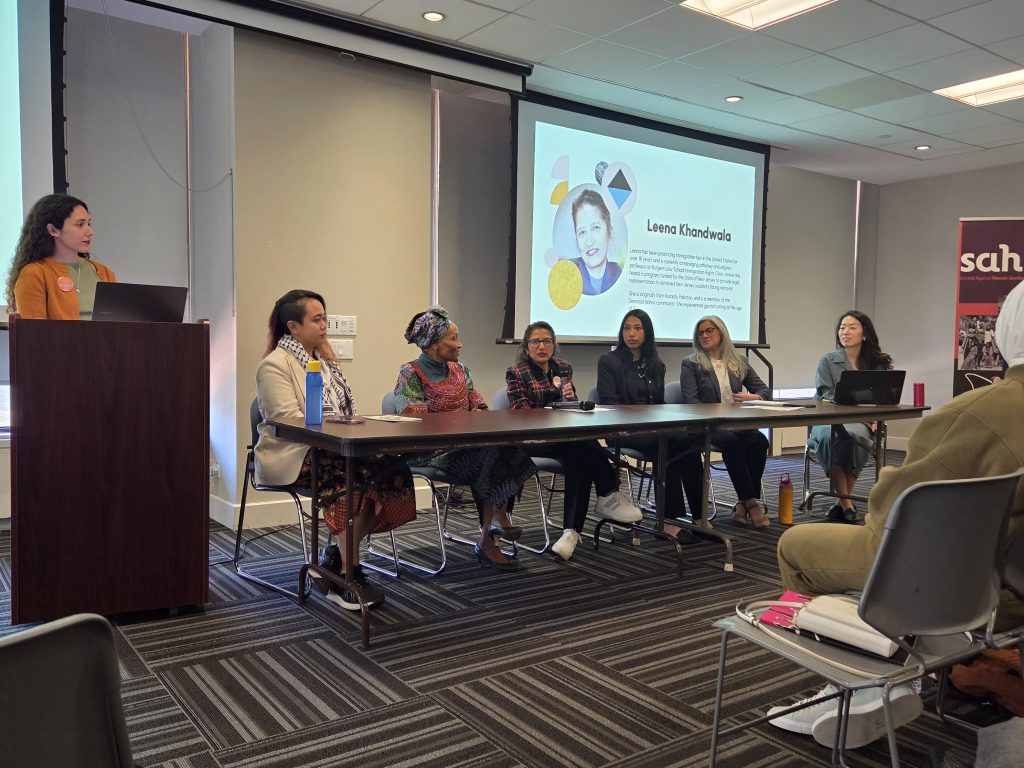
On March 18, 2025, Sahiyo co-hosted a powerful parallel session during the 69th Commission on the Status of Women titled “Storytelling as a Tool for FGM/C Survivor-Centered Change.” Organized in partnership with the Voices to End FGM/C program collaborators—Silence Speaks and the Asian Women’s Shelter—the event took place at the Church Center for the United Nations in New York. The event highlighted the experiences and powerful narratives of survivors and advocates, exploring storytelling as an effective method to foster understanding and drive social change. The session was facilitated by Sahiyo co-founder and Executive Director Mariya Taher and moderated by Su Young from the Asian Women’s Shelter. Speakers included Zehra Patwa, Dena Igusti, Saza Faradilla, Leena Khandwala, and Angela Peabody, each offering unique perspectives and deeply personal experiences to the conversation. During the panel, two of the storytellers, Zehra and Leena, reflected on the renewed and unexpected emotions they felt while watching their digital stories again. As participants in Sahiyo’s inaugural Voices to End FGM/C workshop (formerly called Sahiyo Stories), it had been a long time since they’d both viewed their stories, particularly in a public setting. This moment reminded us how powerful and vulnerable storytelling can be—even long after the initial release of the stories. As members of the Dawoodi Bohra community, both Zehra and Leena spoke about the resistance they’ve faced for addressing FGM/C openly. Still, they each shared how, at different moments in their journeys, speaking out has not only empowered them personally but has also helped spark dialogue and awareness within their families and broader social circles. Another impactful moment was the discussion around language. Saza, who recorded her story in Bahasa Melayu, shared that although she doesn’t feel especially fluent in her community’s native tongue, she felt strongly that it was important to tell her story in that language. For her, doing so was a way to reach members of her own community in Singapore and the broader diaspora. She expressed hope that her story might resonate with communities in Malaysia, Indonesia, and Brunei, where similar experiences are generally underrepresented, and oftentimes never even spoken of. Angela also shared a deeply personal reflection. Though not a survivor herself, she spoke about how creating her digital story during the workshop marked the first time she talked openly about what happened to her childhood friend who underwent FGM/C. She recalled seeing her friend again two years after she went into the Greibo bush and wondering why she no longer wanted to play with her. Angela’s story was a powerful reminder of how FGM/C can impact not only those who experience it directly but also those around them. Dena, a trans-nonbinary survivor of FGM/C, spoke openly about the internal struggles they faced while developing their digital story. They described grappling with feelings of not being “trans enough,” or even “a survivor enough.” Their vulnerability in naming these feelings brought attention to the nuanced layers of identity, belonging, and validation that many look for when deciding to share their stories publicly. Many attendees were excited and expressed a desire to see more of the digital stories and learn from Sahiyo’s storytelling model. We’re hopeful that these conversations will lead to new partnerships and expanded opportunities to support survivors in sharing their experiences, on their own terms and in their own voices. Visit our Voices to End FGM/C website to learn more!
Join Sahiyo, the Asian Women’s Shelter, and Silence Speaks for a Parallel Event at the 69th Session of Commission on the Status of Women in New York
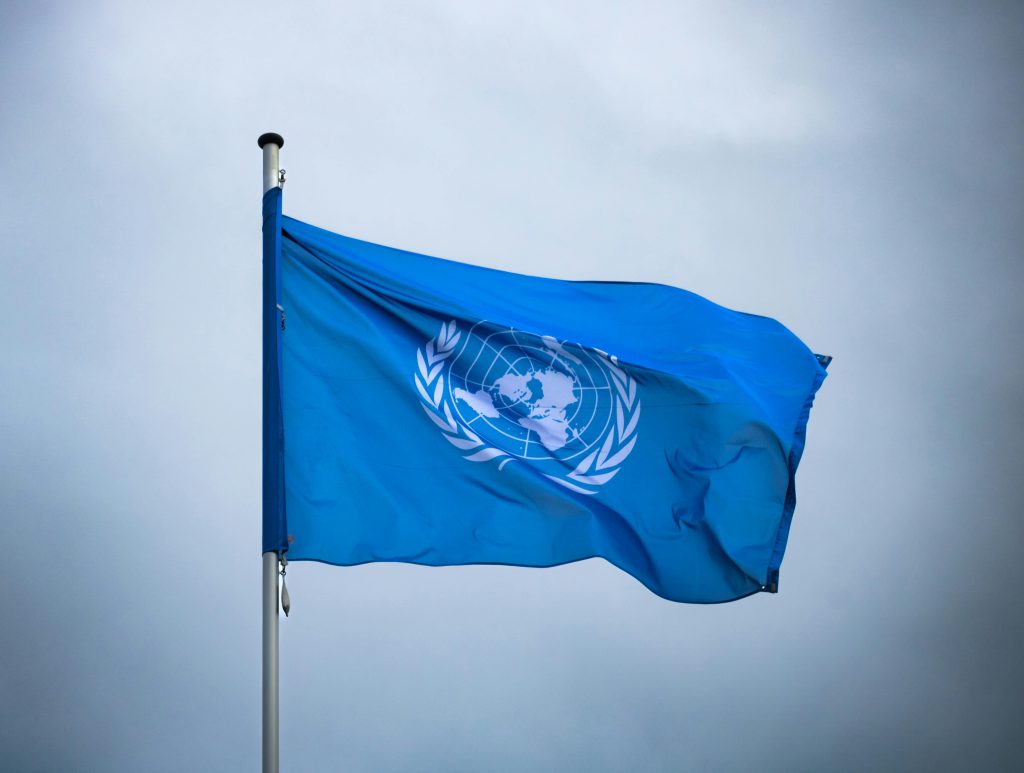
On March 18, 2025, Sahiyo, in collaboration with the Asian Women’s Shelter and Silence Speaks, will host a parallel event at the 69th Session of the Commission on the Status of Women (CSW69) in New York City (NYC). The Commission on the Status of Women (CSW) is a global body committed to the protection, advancement, and empowerment of women. Launched in 1941, CSW seeks to highlight the lives of women and girls around the world and find solutions to the problems that face them, such as poverty, education, the gender pay gap, and violence. This year’s commission will take place from March 10 to 21, 2025 in NYC. Sahiyo’s event, “Storytelling as a Tool for Female Genital Mutilation/ Cutting (FGM/C) Survivor-Centered Change,” will feature a selection of compelling stories from our Voices to End FGM/C program showcasing the resilience and courage of survivors. We will explore our storytelling approach and its effectiveness in advocacy and support for survivors of FGM/C, providing insights into how these narratives have been utilized to drive systemic change and enhance culturally competent care. The Voices alumni attending this event are Leena Khandwala, Saza Faradilla, Dena Igusti, and Zehra Patwa. Additionally, there will be a panel discussion with Voices alum to allow the storytellers to discuss how their stories have supported and uplifted their work, their conversations on FGM/C, and benefited their healing as survivors themselves. The storytellers will also discuss how their stories have been used to further impact in the overall movement to end FGM/C. The event will be moderated by Mariya Taher, Executive Director and Co-founder of Sahiyo, and Su Young, Associate Director of Asian Women’s Shelter. We look forward to connecting with individuals dedicated to ending FGM/C and those eager to learn more about this critical issue. Event Details: Date: Tue, 18 March, 2025 Time: 12:30 pm – 2:00 pm ET Location: Church Center for the United Nations (CCUN), 2nd Floor, 777 United Nations Plaza, New York, NY 10017 Registration: https://bit.ly/SahiyoCSW69
Cave of Consciousness
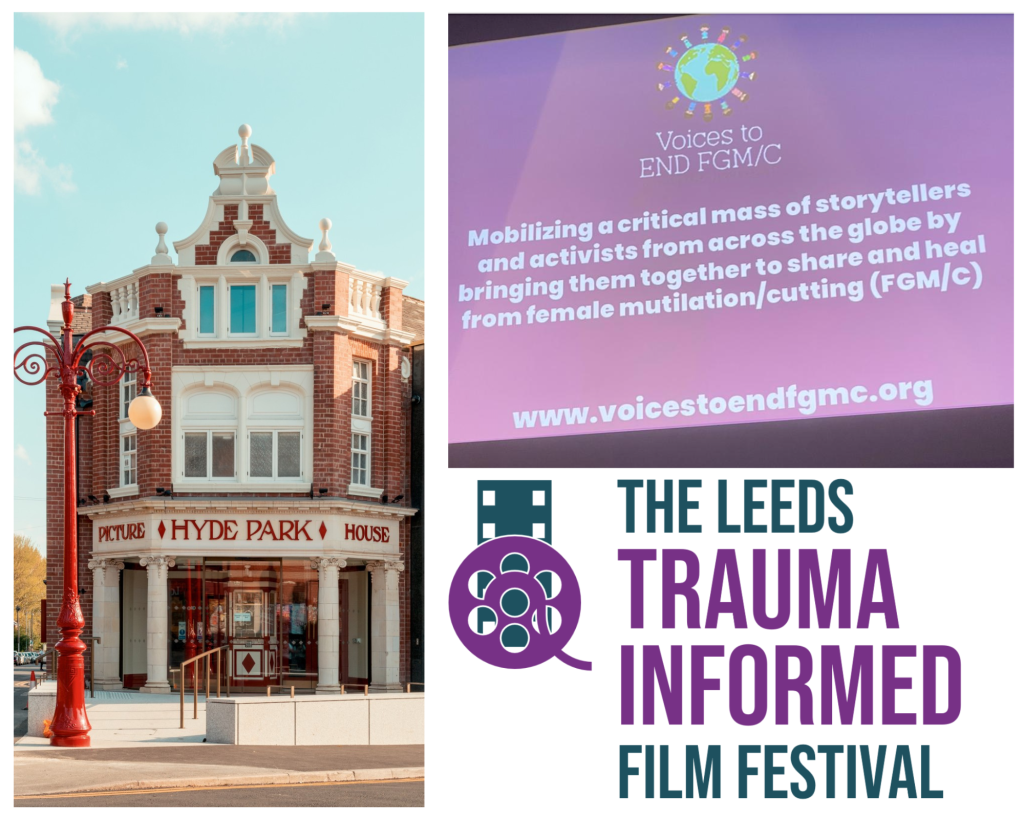
Recently Sahiyo’s Editorial Assistant Megan Seaver sat down with 2022 Voices to End FGM/C Alum Ibtisam to discuss the screening of her Voices digital story at the 2024 Trauma-Informed Film Festival, Leeds, UK. Voices to End FGM/C is a collabortive project between Sahiyo and Silence Speaks mobilizing a critical mass of storytellers and activists from across the globe by bringing people together to share and heal from their experiences of female genital mutilation/cutting (FGM/C), connect and grow as leaders in their communities, and create short videos calling for an end to this harmful practice. Below Ibtisam speaks about her experience at the screening, and how sharing her story has opened her up to new forms of activism and change. 1. Why did you feel compelled to submit your digital story to this film festival? I felt my piece was a perfect match with the festival’s theme because it is about a trauma that I went through. But most importantly, I wanted to submit my video to this festival because FGM/C is just something that’s not on people’s radar. There’s very little awareness, and so I wanted to shine a light on the issue by submitting my film. 2. How was your experience at the screening and what was it like sharing your story in that format? It felt really surreal. I’m a big film buff, so to see my own film to be projected in the cinema hall – I just don’t have words for it. Also, to see what I had shot on my little iPhone in the Ingleborough caves – to be put up on a huge screen with all the other films – was amazing. To be sitting in the audience with no one else knowing that it was my film up there, but I could hear people’s response, like the gasps, It felt larger than life. It also brought back memories of when I made the film. I felt that I had gotten some distance from it over the years. Suddenly, it felt up close and big, reminding me of the impact that the experience had on me. Seeing it in the big dark cinema hall made the impact of the film even greater for me. 3. What was the reaction to your story at the screening? Well, I didn’t know anyone in the audience, I don’t have a specific memory of people’s reactions. What I do remember is that after everyone’s films were shown, they called us up on stage and I remember I did not want to go up as I was quite shy. But there was another participant, a transgender man who had shared his film, who was very confident and he said, “What, I am going up alone? No one is with me?” and immediately after he said that I thought to myself, “Ok, I’m just going to do it. I’m going up there.” And then all of us followed him up onto the stage together! All of us standing up there, it made me feel like we were healing our trauma collectively. That it does not have to be one person’s voice, but many who stand together against trauma. 4. How was the process of submitting your digital story to this festival? Would you recommend it to other Voices alumni? I think if people are comfortable with it, and if the opportunity comes, trust your gut and take it. I think I did a bit of both, I didn’t overthink it, but at the same time I was mindful of what I was getting myself into. I was also showing my film in a setting that spoke about trauma and the audience understood that. We were in a curated safe place, so I would just say to anyone wanting to do this —just make sure you’re sharing in a safe space. Sharing my story at the film festival gave me the courage to speak out about FGM/C more in my life. I always say that courage needs encouragement. In order to be open about this, we need support. 5. What do you hope people learn from your story? First of all, I hope my story provides more awareness around FGM/C, because for most people it’s not even known. Also, my story will be included in the film festivals program at other screenings, so it’s going to reach even more people hopefully and it will take on its own life and journey. When I made this short film two and half years ago, I never would have thought that something like this would happen. The whole process of creating this film was amazing as well. In a lot of ways, I feel that the caves called to me and that I was meant to include them in my story. I just can’t believe the ways in which this story has come to life. When I was first submitting this project, I was asked whether or not I wanted to include my name, and I decided that I was ready for that – I was ready to own my story. 6. Is there anything else you would like to add? I just wanted to say that all of this is a part of the journey. In any movement you may feel that there are times when you have “done your bit”, and then you take a backseat, but there will come a time when something else pushes you to be more involved. I also want to congratulate the founders of Sahiyo, as they continue to do this work and the advocates and activists, who are doing this work in different ways. I also want to highlight how this experience has changed my perspective on my story. Before submitting it to the film festival I had a lot of time away from the video. I hadn’t watched it since the release, so seeing the film again made me realize that for myself, some parts of me had been healed, others had been revealed,
What Not to Say
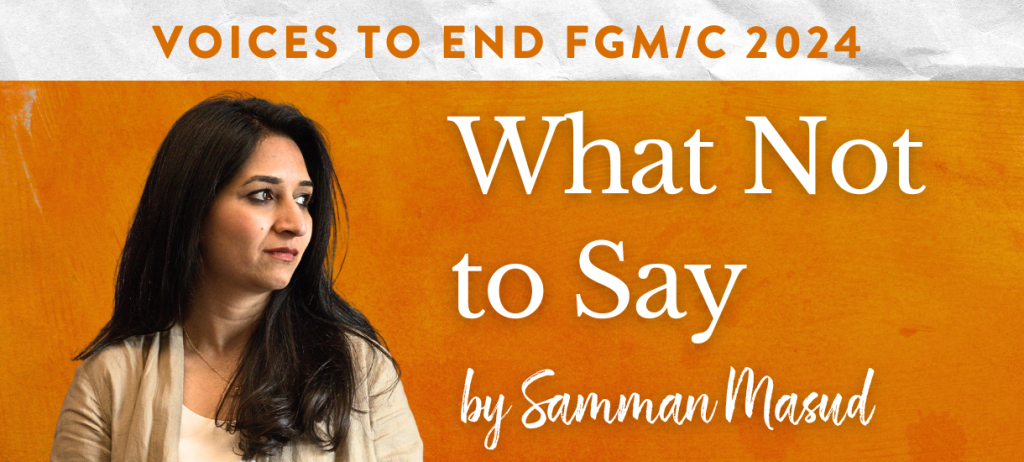
By; Samman Masud In this digital short film, “What Not to Say”, I wanted to take the opportunity to talk about the experiences and conversations I had with my community members around the time I gave birth to my two wonderful daughters. To some, these experiences would not necessarily qualify as microaggressions, nor are they typical cases of gender-based violence, but these discourses warrant a much needed conversation and intervention within the Pakistani and South Asian community at large, where misogyny and patriarchal norms are alive and well. In this film I discuss the discomfort I felt when some friends or distant relatives made comments about my second child being yet another daughter. “Do you think it’s going to be a boy this time?” and “Are you going to try for a boy next time?” were questions passed to me very nonchalantly, and although they were meant to be and might even seem like harmless little exchanges, in reality they have the potential for some far reaching and serious implications for women and girls already living in a world laden with gender-based violence. These casual conversations that dismiss the birth of one’s daughter have even bigger impacts in South Asian communities, where the normalization of such denigrating language against an already marginalized group can worsen their conditions, if not change them for the better. We know that the preference for male children throughout societies in the international community stems from various religious, cultural, socio-economic realities, but the progress made over the years in the women’s right to work which gave them financial autonomy is shifting the tide and conversation around son-preference, somewhat, as I’ve noticed in my close circle and amongst families of my relatives in Pakistan. A completely accurate analysis of the current global trends in this practice could only be assessed through an in-depth qualitative and quantitative study that I’d love to undertake one day. Yet, despite the progress made in women and girls’ conditions around the world, cultural practices like son-preference remain deep-rooted, difficult to eradicate and have grave consequences for women and girls. I believe that the first step to protecting women and girls can begin at home, where we can disrupt the slightest, subtle conversations that give preferential treatment to male children and men. The opportunity to participate in this storytelling workshop allowed me to discuss this topic that may not seem harmful at the outset, but is in fact part and parcel of the larger problem of gender-based violence. I am lucky to have grown-up in a family where my sister and I were loved and treated equally as our brother, and so was the case for my cousins and friends. But growing up within a South Asian community, I could not ignore the prayers and blessings women gave to expectant mothers about giving birth to a son. I had heard of secret abortions of girl children that took place in India and Pakistan, but a women and gender studies course that looked at an in-depth study of sex-selective abortions among college educated Indian American women in the U.S. blew my mind. Of course I had seen gut-wrenching documentaries with the disturbing stats on the number of girls missing from the world due to the infanticide and femicide epidemic across rural populations. But this revelation of educated women’s preference for sons due to whatever socio-economic backdrops and discourses around feminist agency reasoning was eye-opening. So during my second pregnancy, I wasn’t surprised when some educated women around me casually asked whether I would try for a boy next time. I’ve learned through these exchanges that degrees from institutions do little to disrupt archaic ideas through which practices like gender-based abortions, or female genital cutting are allowed to continue. Instead, community education and public awareness can bring incremental change and eventually end them. This workshop allowed me to do just that and hopefully will raise awareness about an issue through a storytelling medium that truly has a transformative potential and one I love so much. [youtube url=”https://youtu.be/QZGUVi76GMU”] Samman Masud serves as the Community Engagement Coordinator at Sahiyo, where her responsibilities include overseeing the Activists Retreat Program and spearheading the male engagement initiative focused on educating and raising community awareness about female genital cutting. Her background features extensive engagement in human rights advocacy, including roles within the strategic communications department and participation in human rights for youth campaigns at Amnesty International USA. Samman holds a B.A. in Political Science and a Master’s in Human Rights and Women & Gender Studies, reflecting her deep academic and practical interest in advancing gender equality and human rights.
Not Who I Am
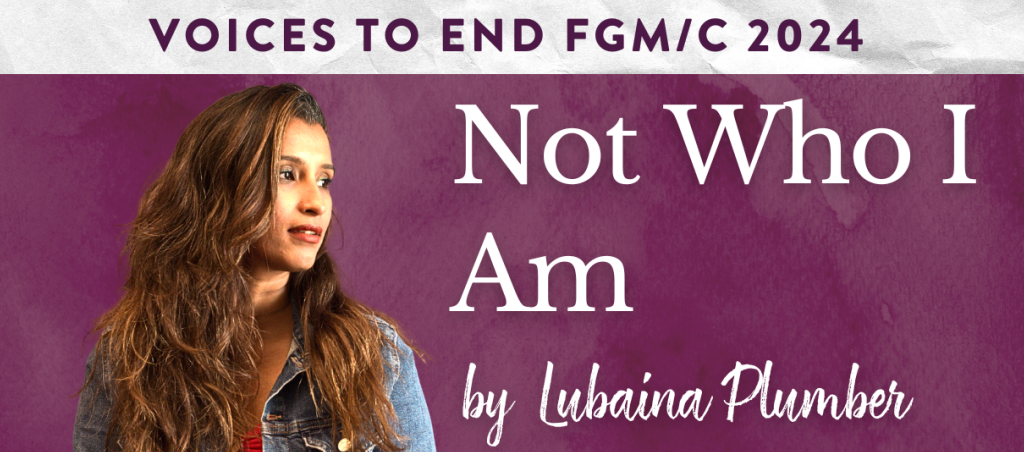
By; Lubaina Plumber Why did you want to attend the workshop and share your story? So, to me it was a natural next step when I was given the opportunity to be part of the Voices Workshop. I’ve worked in gender based violence my whole life and as a survivor myself it’s important to share my story. I wanted to take my advocacy forward, and while I’ve been vocal about FGC in writing and in closed circles, never have I shared this story quite so publicly, in a video format. It was also a way to share my story with more people in a bite-sized way. Another reason why I wanted to share my story and attend the workshop was because I wanted to meet more people who were doing the same type of work I was. I met a lot of people that I wouldn’t have, had I not attended the workshop. That was a huge driving force for me to attend. What story did you choose to tell and turn into a digital story? I chose to focus on the aspect of sexual pleasure and your relationship with your body and how FGC affects those things. When I was younger, the impact was immensely emotional and psychological, but during my journey as I learned more I realized how the practice impacts the way you feel not just emotionally but sexually, physically, and physiologically too. I talked about having to accept that your body is different, and that you’ll never really know what and how it could’ve been if you weren’t cut. I was always told that FGM/C was done to curb women’s pleasure. I learned from the Activists Retreat that you actually can go to a doctor in the United States and ask them to tell you what’s different, how your body has changed, and that was a wild possibility to me. Women’s bodies and sexuality have been and are being controlled and repressed for centuries, and the fact that so many communities practice FGC to uphold that misogynistic ideology is gut wrenching and needs to stop! What have you learned or most enjoyed during what workshop by meeting others who also share their stories? The thing I enjoyed the most was being able to be present in the same space with the other participants and be in-person with them. I really enjoyed the pre-sessions where we all got to meet each other and talk beforehand. I think that made me feel more comfortable –to be able to share my story in that space with people I had a common understanding with was really powerful. We all became close friends through the workshop, getting to work on our stories and videos together throughout the process, and then getting to watch them together at the end – I think that was the highlight for me, I felt like I didn’t have to work in isolation. A crucial part of advocacy is solidarity. I’ve always had allies in my close friends and some family but to have a whole group of people who truly understand your journey because they have a story too and are vulnerable enough to share it with you is just beyond powerful and heartwarming. You feel heard, safe, understood, and held. I feel immensely grateful to share space with those I met at the workshop. What kind of impact would you like your story to have? I’m interested in sharing my digital story with my wider circle. I usually don’t send people my articles and things like that, unless it’s to my parents or close friends. But this I want everyone to see, and I want to be loud about it. I hope that once I show it to people it makes them want to be loud about FGC, women’s rights, and sexual pleasure too. I hope it inspires people to really think about their relationship with their own body and their sexual well-being. I also hope it inspires people to speak out against FGC. Is there anything in your digital story that you would like to share? I want to highlight that as a child and a young survivor we deserve protection because we did not know better. And only now as grown women we are using our voices to try and stop these terrible things from happening. So I want people to know that. [youtube url=”https://youtu.be/ivMmdlvpgzY”] Lubaina Plumber is passionate about driving social change through public policy and human rights law work. Outside of work, she loves spending time with interesting people, uncovering hidden gems while traveling, diving into gripping books and podcasts, and nurturing her garden.
Support
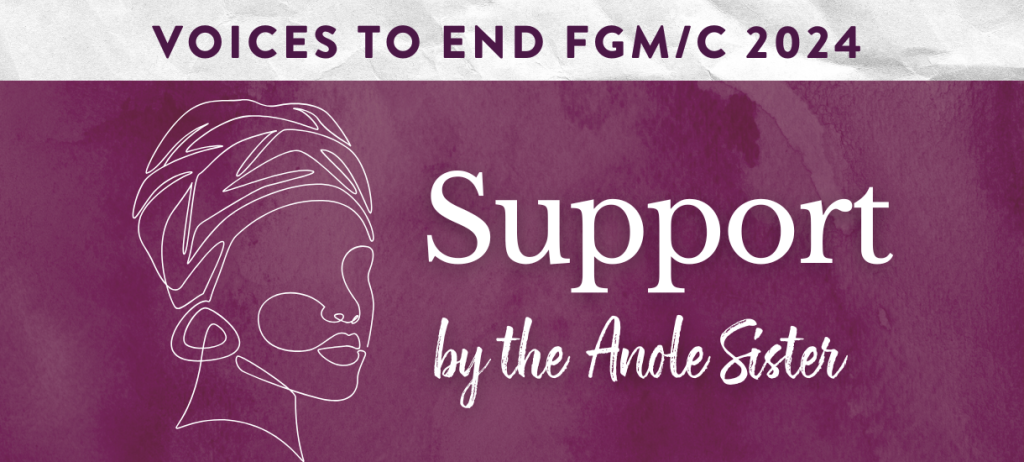
By The Anole Sister Being an Anole Sisters member, I am an FGM/C survivor. For the past four decades, I have lived with this experience. Since 2015, I have been advocating for and raising awareness about FGM/C along with other survivors, women, and girls at risk. However, I had never shared my story publicly until I joined the Sahiyo Voices to End FGM/C workshop in 2024. At the workshop, I created a video and shared a story from my childhood that had been buried deep within me. This act of sharing not only inspired me but also resonated with many in the audience, breaking a long-held silence. Now, I feel much more empowered to encourage others to share their stories, to let go, and to continue advocating against FGM/C. I used to be nervous about sharing my story with other people, but not anymore. I love my story, that’s why I chose to tell it and attend the workshop. I also wanted to attend the workshop so that I could hear other people’s stories, and so that we could learn from each other. I want my story to bring awareness to the issue and to the community. I also want people who don’t know about the practice to learn more about FGM/C, so more people might share stories that are similar to mine. In this workshop, I really enjoyed learning, and listening to all the stories of the other participants, each of which are different and important. My advocacy is something that will never stop. We still have a lot of sisters who have been through this practice. I want to help them speak about that and encourage others to share their experiences too, so that people can learn about FGM/C. I also want to continue my advocacy because I want this program to continue. There are a lot of sisters back home who have never shared their stories and it’s very important for them to come together and learn from each other. My story is my own, and no one can hold me back from sharing it. [youtube url=”https://youtu.be/bBbkAifSj5A”]
Voices to End FGM/C 2024 Cohort Video Screening
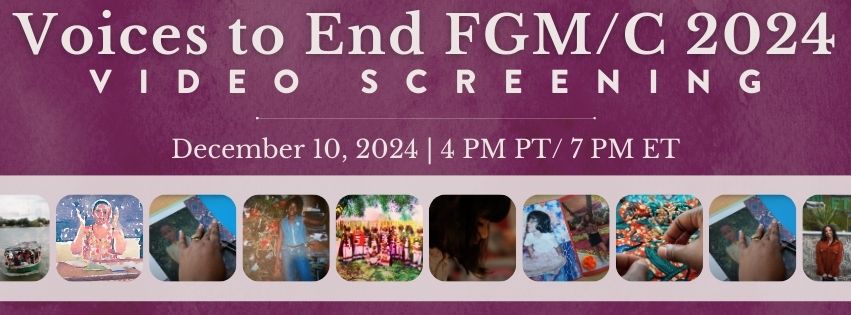
Date: December 10, 2024 Time: 4-5:30 PM PT/7-8:30 PM ET Registration link: https://bit.ly/RegisterVoices24Screening On Tuesday, December 10th at 4-5:30 PM P.T./7-8:30 PM E.T., Sahiyo – in partnership with Asian Women’s Shelter and Silence Speaks – will host a screening of the newest set of Voices to End FGM/C digital stories, created by survivors of and advocates working to end female genital mutilation/cutting (FGM/C). In addition to viewing these 10 new poignant stories, attendees will hear from some of the storytellers themselves about their experiences in the storytelling workshop and their work to end FGM/C. “It’s like we created our own community as we held space for one another while bearing witness to each other’s stories as they were told. I also appreciated and valued the accommodations made to ensure that all participants had the best possible experience. It’s things like this that made the workshop a special and meaningful space to be a part of. ” – Musu Bakoto Sawo, Voices ‘24 Workshop Participant The Voices to End FGM/C program is a digital storytelling project created by Silence Speaks and Sahiyo that aims to mobilize a critical mass of survivors and activists from across the globe. Voices to END FGM/C brings people together to share and heal from their experiences of FGM/C, to connect and grow as leaders in their own communities, and to create short videos calling for an end to this harmful practice. If you are interested in hosting a screening showcasing digital stories from Voices to End FGM/C with your own organization, with classmates, or with co-workers, check our new Voices to End FGM/C Screening Guide! This is an in-depth resource with discussion questions, FAQs, and event planning templates. For any questions related to this guide or our Voices program, please email aries@sahiyo.org.
Breaking the Silence
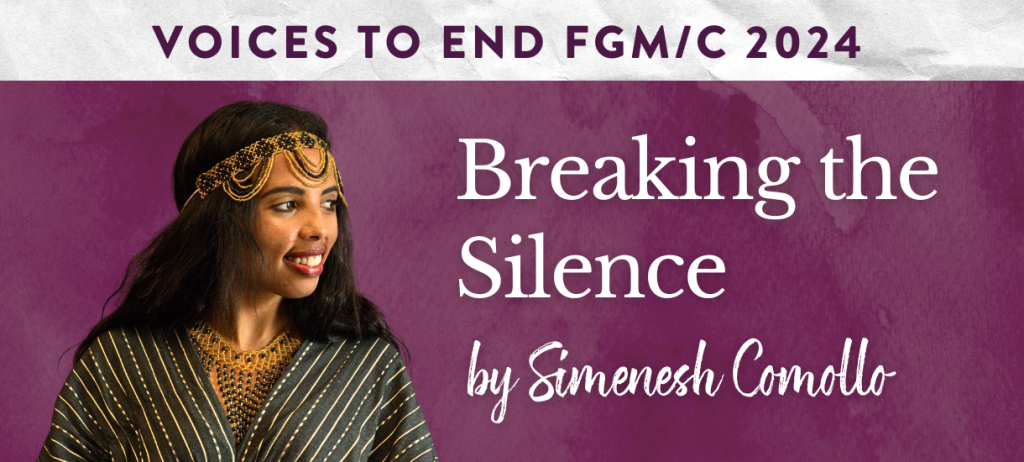
Why did you want to attend the workshop and share your story? I wanted to attend the workshop because I recognized it as a unique opportunity to share my journey with FGM/C, a silent struggle I had endured for years. The workshop offered a platform for me to break that silence, connect with others, and contribute to a movement aimed at ending this practice. I felt that in sharing my story, I could help raise awareness and inspire others to join the movement to end FGM/C. What story did you choose to tell and create into a digital story? I chose to tell my personal story as a survivor of FGM/C. This experience had been a dormant part of my life, until about two years ago when I encountered discussions about FGM/C in an American context. Since then, my involvement with organizations dedicated to ending FGM/C has allowed me to begin addressing the scars and pain of my own past. My digital story captures this journey of healing, advocacy, and the steps I’ve taken to raise awareness and give support to other survivors. What have you learned or most enjoyed during the workshop and by meeting others who shared their stories? During the workshop, I learned the power of vulnerability and the strength that comes from sharing personal stories. Meeting others who shared their experiences with FGM/C was profoundly healing and empowering for me. Hearing from other survivors helped to create a sense of community and solidarity, reinforcing the importance of collective action in advocating for change on this issue. The part of the workshop I enjoyed the most was the connections I made with the other participants and the support we were able to give each other within our shared mission to uplift our voices and end this practice. What kind of impact would you like your story to have? I hope my story will break the silence and shame surrounding FGM/C, and encourage more open conversations on the issue. I aim to inspire legislative changes in order to help end this practice and provide safe havens for those who are affected by it. Additionally, I want to connect with other survivors, offering them support and a sense of community. Ultimately, I hope my story will educate and foster awareness, driving more people to join the movement against FGM/C. Is there anything in your digital story that you would like to share? In my digital story, I highlight my journey from silent suffering to active advocacy. I share my involvement with organizations dedicated to ending FGM, the healing process I’ve undergone, and my renewed determination to speak out against this practice. This story is not just about my pain but about my growth and commitment to making a difference. I hope it resonates with others and encourages them to take action too. [youtube url=”https://youtu.be/BEq1SkYRZTc”] Simenesh Comollo is a domestic violence advisor for the Connecticut Coalition Against Domestic Violence. In this role, she provides support, guidance, and resources to individuals affected by domestic violence, helping them navigate complex situations and access the help they need. Alongside her work, she is pursuing a graduate degree in social work, where she is learning to further enhance her skills and knowledge to better serve her community. Her journey to the United States began when she was adopted at the age of 14, and she has now spent 14 years here. This experience has shaped her perspective and fueled her dedication to advocacy and social justice. She is particularly passionate about human rights, with a strong focus on addressing and preventing gender-based
My Story, My Voice
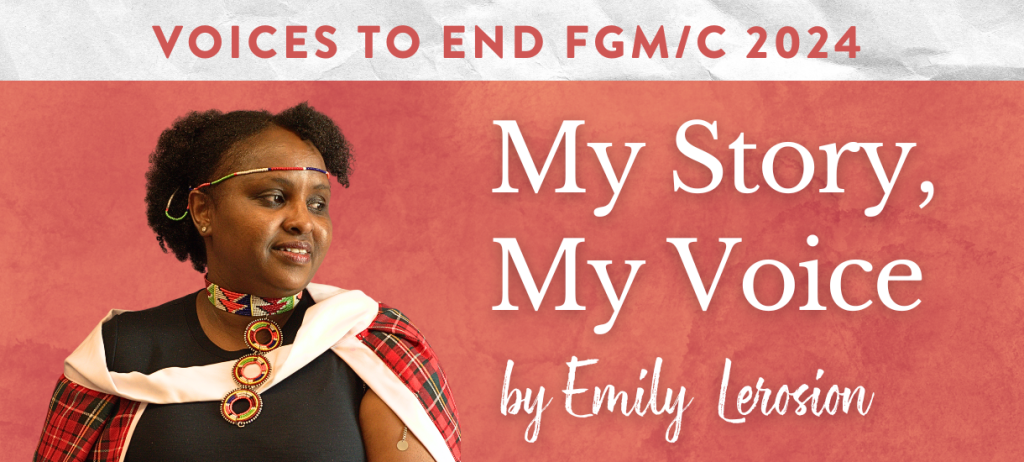
Why did you want to attend the workshop and share your story? I was interested in attending the workshop as it was the first one that I had come across that focused on survivors of FGM/C. I wanted to connect with other survivors and hear their stories, while also being able to share my own story with other survivors as well. I felt like it was going to be a journey for my healing process, which is still ongoing. I wanted to share my story with the world so people can start to understand how this practice can affect a person both physically and mentally, I also wanted to share my story to help others. I’ve been an activist for years and had spoken against other topics, like arranged marriages for young girls and other horrible things, but never about FGM/C – never my personal story. Many of the young girls I try to help don’t always understand that I was in a similar situation to them and that I really know how they feel. That’s another reason why I wanted to speak out – to make the young girls I help feel seen and heard. What story did you choose to tell and create into a digital story? I spoke about my experience with FGM/C and how I went through it unknowingly. I was around 12 or 13 years old when it happened. I spoke about the process of it – the pain of it, and the embarrassment of being exposed as a teenager to a group of adult women like that. Then later the misplaced excitement as my community told me that being cut was something to be proud of. It would not be until much later in my life that I would realize what was taken from me, that I would fully understand the scope and depth of my trauma. It felt embarrassing to speak about it for many years. Due to the fact that I was just beginning to come to terms with what had happened and because I was fearful of reactions from my community. I knew that if I spoke out against FGM/C, I would be criticized by both my community and those outside of it who did not understand the complexity of FGM/C. I was living in denial really, of what happened to me, and I came to this realization that if I kept it inside, I would never heal from it. So that’s [another reason] why I decided to share my story –to ensure that I get some healing. What have you learned or most enjoyed during the workshop and by meeting others who have shared their stories? It was one of the best workshops I’ve had in several years. I’ve gone to other workshops where people just meet and they share powerful stories, but these ones were really impactful to me. The fact that these women have been deprived of their rights, but are still standing strong and coming out against the practice. It gave me a lot of strength and courage. Being able to mingle and talk with these women and create a bond of love and sisterhood between us was one of the most powerful parts of the workshop for me. I think the workshop has [also] helped me be more open to sharing my story with others. Before the workshop, I would just speak up against other forms of gender-based violence, even though I knew that FGM/C was wrong. Now after the workshop and speaking with other survivors, I feel more comfortable speaking on the topic. However I’m still on my healing journey. I’m not 100% comfortable sharing my experience with everyone, particularly my brother and my community. Sometimes I worry about how they will react to my story once it’s out there – what will they say? But I also know that the more I tell the story, the easier it will get. That’s why I hope that the digital story will help me [explore] other platforms and connect me to other organizations also fighting this practice. What kind of impact would you like your story to have? I want my story to open up the eyes of communities that still practice FGM/C and [shed light on] the effects and how traumatizing practice can be. When people look at us, we [seem] physically okay. We are driving, we are doctors, we are whatever…but something deep inside has been affected, been taken, and we need to acknowledge that. When you get to sit down with a woman that has gone through FGM/C, she may just burst out into tears when she tells you what she’s gone through because it has been buried deep within. So I would love my story to expose the emotional harm of the practice, and to give others an idea of how FGM/C affects a survivor for the rest of their lives. For example, going through the practice can make it difficult to form connections and relationships, because of embarrassment, sexual discomfort. In some cases, FGM/C makes it diffcult for women to have children. I will always feel that FGM/C took away my voice. It made me feel like I could not speak up boldly anymore. Now that I have shared my story, I feel more confident in helping others who have been through the practice. I would want my story to empower people out there to speak up as well. Is there anything from your digital story that you would like to share here? Yes, I would like to talk about the person who is the reason for me being able to share my story in the first place– my partner. He’s always been very supportive of me and my work, [and] he’s been a really positive force in my life. So when I heard about the workshop I told him about it. I was a little hesitant to attend, but he really convinced me to go and he encouraged me to
Perseverance and Power
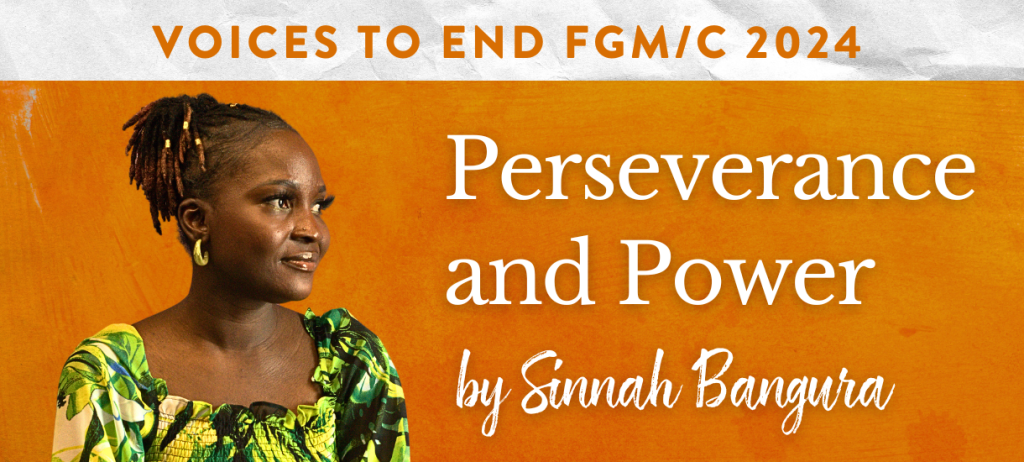
By Sinnah Bangura After I had my daughter, I was introduced to a support group with other survivors of FGC. I found a YouTube video where a survivor was speaking about her experience undergoing the practice and the impact it’s had on her life. It was at this point that I began to understand more about what had happened. In the support group, we talked about a variety of different topics like the impact of FGC, how to talk about the practice to other people who may not know what FGC is, and how FGC impacts motherhood. It was in the support group that I also began to learn about clitoral restoration surgery and the benefits of the procedure. I had my surgery done in California with Dr. Bowers, for which I will forever be grateful. After finding out about the support group, being welcomed with open arms, and being offered a safe space, I found the courage to talk about my story. When the opportunity to open up about my story with Sahiyo came up, I was up for it and willing to share my story again. I wanted to speak out and raise awareness about the surgery. I wanted my fellow sisters to know that there is a surgery out there and that anything is possible no matter what you’ve gone through. It’s not where you’ve been but where you’re going. I was also excited about coming together with my fellow survivors and sharing our stories, as well as bonding with them over our shared experiences. When I went through FGC, something was taken away and I was determined to find a solution. The surgery has had a huge impact on my healing journey; it has allowed me to feel more confident, made it easier for me to speak out about my experience, and made me determined to tell others about it and its benefits. In addition to sharing stories, what I most enjoyed during the workshop was bonding with my fellow survivors. I really enjoyed the dinner that fellow storytellers, Rufo, LP, and I went to at an Indian restaurant. The food was really great and I learned a thing or two about India. Also, I enjoyed the workshop itself – everybody coming together, talking to one another, and shedding some tears about our experiences. I enjoyed working with the Sahiyo, Silence Speaks, and Asian Women’s Shelter staff, too; they were amazing, assisting us through our storytelling and editing process. I want to raise awareness and help end this harmful practice. I want my story to give my fellow survivors the courage to speak out about their experiences so they too can start the process of healing. That is the only way I believe change will happen. I wholeheartedly believe that one day this practice will come to an end. [youtube url=”https://youtu.be/KTESPpqeKH4″] Sinnah Bangura, a dedicated Generation Hope Scholar, a nonprofit organization that advocate for student parents nationally & help teen parents thrive in college. A wife, and parent from Sierra Leone, is currently pursuing her Associate in Education. With three children—Romeo, Layla, and Omar— she balances her studies while looking forward to transferring to university for a degree in Education. Sinnah is driven by a passion to share her story with the world, aiming to raise awareness and help end harmful practices. She is particularly eager to discuss her journey, including her surgery, with fellow survivors, offering hope and information about available options. Sinnah finds joy in creativity, especially through music and dance, and she approaches life with a strong enthusiasm for continuous learning.
